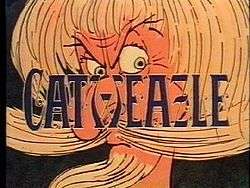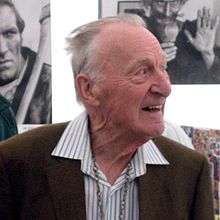Catweazle
Catweazle is a British fantasy television series, starring Geoffrey Bayldon in the title role, and created by Richard Carpenter for London Weekend Television. The first series, produced and directed by Quentin Lawrence, was screened in the UK on ITV in 1970. The second series, directed by David Reid and David Lane, was shown in 1971. Each series had thirteen episodes, most but not all written by Carpenter, who also published two books based on the scripts.
| Catweazle | |
|---|---|
 Catweazle opening titles | |
| Created by | Richard Carpenter |
| Starring | Geoffrey Bayldon |
| Country of origin | United Kingdom |
| No. of series | 2 |
| No. of episodes | 26 |
| Production | |
| Running time | 25 minutes |
| Production company(s) | London Weekend |
| Release | |
| Original network | ITV |
| Original release | 15 February 1970 – 4 April 1971 |
Summary
Catweazle (Geoffrey Bayldon) is an eccentric 11th-century wizard who accidentally (by total immersion in water) travels through time. In the first series he arrives in the year 1969 and befriends a red-headed teenager, Edward Bennet, nicknamed Carrot (Robin Davies), who spends most of the rest of the series attempting to hide Catweazle from his father (Bud Tingwell) and the farmhand Sam (Neil McCarthy). Catweazle searches for a way to return to his own time while hiding out in a disused water tower, which he calls Castle Saburac, with his familiar, a toad called Touchwood.
The second series featured a 12-part riddle that Catweazle, transported to the 1970s, attempts to solve at the rate of one clue an episode, the solution (as he thinks) being revealed in the 13th.
A third series, which was apparently to be set on the Bennets' farm from the first series rather than the stately home of the second series, never got past the drafting stage.
Catweazle mistakes all modern technology for powerful magic (an example of Clarke's third law), particularly "elec-trickery" (electricity) and the "telling bone" (telephone). Often he tried spells that failed and he would sigh "Nothing works". Feeling flushed with success in the final episode, his last words were "Everything works Touchwood, everything works!".
Both series were shot on 16mm film. The first series was mostly shot on location at Home Farm, East Clandon, near Guildford in Surrey, England in 1969. The second was mostly filmed around the Bayford/Brickendon area of Hertfordshire in 1970 (S02E12 shows scenes of Brickendon and near Bayford station). Interior scenes were filmed at Halliford Studios in Shepperton.[1]
Both series centred on the relationship between Catweazle and the young lad from the present day who quickly accepts Catweazle as a friend. The second series had a more farcical character than the first. In the plaster fight scene in the episode 'The Enchanted King'. Cedric's parents were slightly unhinged gentry living in their family stately home. Almost all characters seemed out of touch with reality except Cedric. In the second series Catweazle sings/speaks to himself using the series theme tune.
Although Bayldon thought the story had run its course after two series,[2] he still praised the second, commenting that two episodes were, in his view, below standard, but not written by Carpenter: "There are two episodes I felt that with; the rest I think are lovely. I thought they were dreadful, but they were not written by Richard. They were written when we were behind."[2]
The series won the Writers' Guild of Great Britain award for Best Children's TV Drama Script in 1971.
Series 1
The series appeared on television for the first time on Sunday, 4 January 1970 in the Netherlands, broadcast by the NOS. It was originally shown in the UK between Sunday, 15 February 1970 and Sunday, 10 May 1970 at 17:30–18:00 in most regions.
Cast

Main characters
- Catweazle: Geoffrey Bayldon
- Edward Bennet (Carrot): Robin Davies
- Mr. Bennet: Charles "Bud" Tingwell
- Sam Woodyard: Neil McCarthy
Other characters
- Theda Watkins: Marjie Lawrence (episode 2)
- Stuffy Gladstone: Peter Sallis (e3)
- Miss Arthur: Anne Jameson (e3)
- Miss Bonnington: June Jago (e4)
- Miss Willoughby: Ruth Kettlewell (e4)
- Audrey: Carmel Cryan (e4)
- Doris: Ursula Smith (e4)
- Madam Rosa: Hattie Jacques (e5)
- Albert: Ellis Dale (e5)
- Woman at bus stop: Betty Woolfe (e5)
- Mrs Derringer: Marcella Markham (e6)
- Maud: Zulema Dene (e6)
- The Vicar: Brian Wilde (e7)
- Mrs Woodyard: Hazel Coppen (e7)
- Wilkins: Harry Hutchinson (e7)
- Leslie Milton: Aubrey Morris (e8)
- Fred: David Ellison (British actor) (e8)
- Dick: Andrew Bradford (e8)
- Colonel Upshaw: Peter Butterworth (e9)
- Miss Coote: Dorothy Frere (e9)
- Cyril Fitton: Bernard Hepton (e10)
- Sergeant Bottle: John Junkin (e11)
- Charley: John Tordoff (e11)
- Mrs Skinner: Patricia Hayes (e12)
- Arthur: Freddy Foote (e12)
- Aunty Flo: Hilda Braid (e13)
- Dr Jane Matthews: Eileen Moore (e13)
Director
Episodes
- The Sun in a Bottle (15 February 1970)
- Castle Saburac (22 February 1970)
- The Curse of Rapkyn (1 March 1970)
- The Witching Hour (8 March 1970)
- The Eye of Time (15 March 1970)
- The Magic Face (22 March 1970)
- The Telling Bone (29 March 1970)
- The Power of Adamcos (5 April 1970)
- The Demi Devil (12 April 1970)
- The House of the Sorcerer (19 April 1970)
- The Flying Broomsticks (26 April 1970)
- The Wisdom of Solomon (3 May 1970)
- The Trickery Lantern (10 May 1970)
Series 2
This series was originally shown between Sunday 10 January 1971 and Sunday 4 April 1971 at 17.35–18.05 (all ITV regions except for ATV, the franchise holder in the Midlands.
Cast
Main characters
- Catweazle: Geoffrey Bayldon
- Cedric Collingford (aka Owlface): Gary Warren
- Lord Collingford: Moray Watson
- Lady Collingford (Dottie Darling): Elspet Gray
- (Henry)Groome: Peter Butterworth
- Mrs Gowdie: Gwen Nelson
Other characters
- Pickle: Bill Owen (episode 2)
- Publican: Jerold Wells (episode 2)
- Vandanti: Paul Eddington (episode 3)
- Inspector Pugh: Derek Francis (episode 4)
- Tearful Ted: Ronald Lacey (episode 4)
- Policeman: Tim Pearce (episode 4)
- Doctor Hawkins: Jonathan Elsom (episode 5)
- Jack Victor: Kenneth Cope (episode 6)
- Richardson: Tony Caunter (episode 6)
- John Gobling: Graham Crowden (episode 7)
- TV story teller: Peter Bayliss (episode 7)
- Mayor: Richard Caldicot (episode 7)
- Professors Oscar & Otto Habbleman: John Ringham (episode 8)
- Mrs Hannah Habbleman: Hana-Maria Pravda (episode 8)
- Hackforth: David Cook (writer) (episode 9)
- Hector Kenley: Dudley Foster (episode 9)
- Colonel Arnold Dickenson: John Welsh (actor) (episode 10)
- Sgt Jones: Tony Selby (episode 10)
- Archie Goodwin: Arthur Lovegrove (episode 11)
- Dr Benjamin Wenik Derek Godfrey (episode 12)
- Boris: Roger Hammond (episode 13)
Directors
- David Reid (7 episodes)
- David Lane (6 episodes)
Episodes
- The Magic Riddle (10 January 1971)
- Duck Halt (17 January 1971)
- The Heavenly Twins (24 January 1971)
- The Sign of the Crab (31 January 1971)
- The Black Wheels (7 February 1971)
- The Wogle Stone (14 February 1971)
- The Enchanted King (21 February 1971)
- The Familiar Spirit (28 February 1971)
- The Ghost Hunters (7 March 1971)
- The Walking Trees (14 March 1971)
- The Battle of the Giants (21 March 1971)
- The Magic Circle (28 March 1971)
- The Thirteenth Sign (4 April 1971)
Home media
Both series were released on VHS in 1998.
The first series was released on Region 2 DVD in the UK in May 2005, with a short reunion documentary "Brothers in Magic" and audio commentaries on selected episodes by Carpenter, Bayldon, Davies and Executive Producer Joy Whitby. The second series was released in August 2005.
In Australia Catweazle: The Complete Series was released in May 2007. In June 2011 both series were released in Region 4.
On 29 March 2010, the series was re-released in the UK to commemorate its 40th anniversary. Among several other additional features were a "Westbourne Museum" image gallery (named after a small local museum in the episode "The Curse of Rapkyn" starring Peter Sallis) featuring the most comprehensive collection of original Catweazle memorabilia and promotional ephemera ever assembled, sourced from The Paul Pert Screen Collection. The release of the 40th Anniversary Special Edition DVD set was also accompanied by a commemorative publication, The Magic Book by Simon Wells and Paul Pert. Robin Davies (who had played Carrot) died just before its publication, on 22 February 2010, at the age of 56.[3][4] The publication includes an article by Pert about the longevity of the Catweazle phenomenon, entitled "A Magical Spell in the Countryside," which contains Robin Davies's last recorded comments about the series that made him a star and about his special friendship with Bayldon. The DVD image gallery also recorded the occasion of their last meeting at an annual commemorative event held at the farm in East Clandon, Surrey, where the first series was filmed in the summer of 1969.
Also featured in the article was an interview with Richard Carpenter in which he gave a frank account of his thoughts on modern television and expressed his desire to bring his writing career full circle with a Catweazle film for the 21st century. He also confirmed that he had drafted a new script.[5] Negotiations for a film had reached pre-production stages when Carpenter died while walking his dog in the countryside at the age of 82 on 26 February 2012.[6][7]
The first episode is available to view in full at the BFI Screenonline site.[8]
The full series is being re-run on the UK free-to-air television channel Talking Pictures TV from Saturday 2 November 2019.[9]
Books
There are two novelisations by Carpenter, one for each series: Catweazle and Catweazle and the Magic Zodiac. Both books were illustrated by George Adamson.[10] A 20-page picture book, Catweazle in Marrow Escape was also produced, written by Alan Fennell. A comic strip version featured in the TV comic Look-in, written by Angus P. Allan, and three annuals were also released by World, from 1970 to 1972.
References
- "Catweazle (TV Series - Filming Locations)". Retrieved 11 June 2020.
- "Catweazle: Interview: Geoffrey Bayldon". Sci-Fi Bulletin.
- "Robin Davies: Actor who found fame alongside Wendy Craig and Catweazle". The Independent.
- The Stage. "Robin Davies – Obituaries – The Stage". The Stage.
- "Catweazle page 5 – The Paul Pert Screen Collection". Paulpert.com. Retrieved 20 July 2016.
- Anthony Hayward. "Richard Carpenter obituary". the Guardian.
- "Richard Carpenter: Actor and writer famed for 'Catweazle'and 'The Ghosts of Motley Hall'". The Independent.
- "BFI Screenonline: Catweazle (1970–71)". screenonline.org.uk.
- "Catweazle comes to Talking Pictures TV" (PDF). talkingpicturestv.co.uk.
- Catweazle (Methuen, cloth; Puffin Books, paperback, 1970) ISBN 978-0-14-030465-7 (paperback) and Catweazle and the Magic Zodiac (Methuen, cloth; Puffin Books, paperback, 1971) ISBN 978-0-14-030499-2 (paperback). See also George W. Adamson web site.